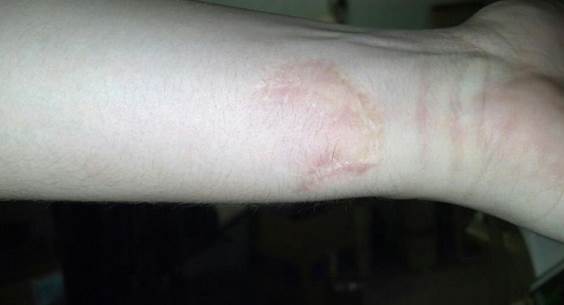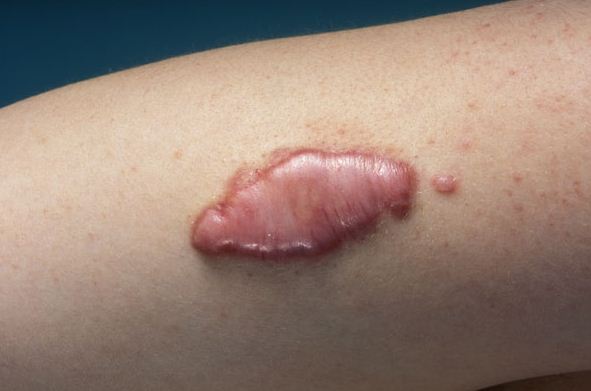If you have a shiny, thick, discolored scar…
You have a keloid scar, which are often genetic and more
commonly occur in skin with a darker pigment. Keloids can vary in color from
pink to red to dark brown, they may be painful and itchy, and they usually
occur on the chest, shoulders, upper back and lower neck. “They’re very
mysterious, and the most challenging to manage, says Dr. Bekhor.
Treatment options
Steroid injections
Keloid scars can be reduced by a program of cortisol
injections over time, and any redness treated with pulsed dye laser, but they
may reactivate two or three years later.

discolored scar
If you’ve got a red, lumpy scar…
You have a hypertrophic scar, which involves an excess of
tissue. These are usually a temporary response to surgery, an injury or a burn.
“Hypertrophic scars tend to heal spontaneously over 12 months, Dr. Bekhor says,
“so we normally use gentle therapies. More aggressive treatment is reserved for
scars that don’t settle down in this time - whether due to burst stitches,
excess tension at the site or a less-than-optimal healing environment.
Treatment options
Steroid Injections
Micro-shots of cortisone solution along with a pressure
dressing, such as silicone sheeting, are applied to soften the scar tissue and
flatten it out.
Pulsed dye laser
Intensive bursts of laser light can accelerate the loss of
redness.
Scar revision
If scars have healed badly, they might be able to be
improved, says Dr. Steve Merten, clinical senior lecturer in cosmetic plastic
surgery at Macquarie University Hospital. Sometimes the damaged tissue is cut
out in order to create a clean, healthy scar.

Lumpy scar
Do over-the-counter treatments work?
No oil, cream, gel or dressing is going to make any class of
scar vanish completely, says Dr. Bekhor, but as long as the treatment is
gentle, they’re not going to do any harm.
“I think massaging scars helps,” adds Dr. Merten, “but it
doesn’t make a lot of difference what you use. Indeed, research shows that
vitamin E oil and Vaseline are equally effective.
The best method to help promote healing and minimize
scarring is keeping the wound site clean, moist and covered. And studies show
that silicone sheeting does the job — but you must keep using it for at least
two months. “If you really want to manage a scar, you have to make an effort,”
says Dr. Merten.
Scar management – Dos and Don’ts
Do
·
Act quickly. Even a graze that isn’t treated and dressed properly
can result in a nasty scar.
·
Avoid sun exposure
·
Wait 12 months before considering treatment. Most scars take that
long to heal and fade. If a scar is still red, that usually means it’s too soon
to do anything about it.
·
Get a referral from your GP to a properly trained medical
specialist, whether you’re having a mole removed or you’re concerned about an
existing scar.
Don’t
·
Smoke. It reduces the amount of oxygen carried by the blood,
which will hamper the healing process.